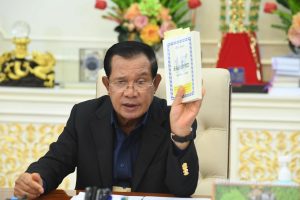United Nations human rights experts have once again spoken out against the worsening political situation in Cambodia, as the government of Prime Minister Hun Sen readies a new legal offensive against dissidents and opposition figures.
In a statement released on November 16, Mary Lawlor, the U.N.’s Special Rapporteur on the situation of human rights defenders, called for an immediate end to the systemic detention and criminalization of human rights defenders, and the use of excessive force by the Cambodian authorities.
“I am increasingly concerned by the circular pattern of detaining them for advocating against the detention of or violations against fellow defenders,” Lawlor said in the statement, which was signed by eight other U.N. human rights officials. “This cycle must end.” She added that at least 21 Cambodian human rights defenders had been subjected to threats and arbitrary arrest in the past three months.
The comments follow a string of arrests that have taken place in 2020, which have reeled in unionists, artists, environmentalists, human rights defenders, monks, and supporters of the banned Cambodia National Rescue Party (CNRP). Lawlor said that around 20 former CNRP activists and officials have also been physically assaulted since early 2020, mostly by attackers riding on motorbikes.
The U.N. rebuke came after the ruling Cambodian People’s Party (CPP) readied a fresh batch of criminal charges for prominent critics of the government. According to copies of court summonses seen by the Associated Press, more than 50 people have been charged with treason for taking part in nonviolent anti-government activities since 2017.
The most prominent member of the group is Theary Seng, a Cambodian-American lawyer who has long been an outspoken critic of the CPP government. Theary, who currently resides in Phnom Penh, is not directly involved with the CNRP, but has described herself as a “vocal, strong, public supporter of its policy and leadership.”
She has been summoned to appear at the Phnom Penh Municipal Court on November 26 to stand trial for conspiracy to commit treason and incitement to commit a felony. The charges carry a maximum sentence of 12 years in prison.
Statements of concern from U.N. officials have been a cyclical, seasonal occurrence in Cambodian politics since the early 1990s, when the U.N. sent a peacekeeping mission to the country in order to end a long-running civil war and implant a democratic system of government.
Initially, in order to sustain the Western aid upon which his government relied, Hun Sen was forced to alternate spells of repression and relaxation, alongside silver-tongued promises of reform. But as the CPP government has come to enjoy stronger backing from a “non-interfering” China, once-seasonal crackdowns have hardened into a permanent state of siege for Cambodia’s opposition parties and human rights defenders.
The repression has steadily intensified since September 2017, when CNRP President Kem Sokha was arrested over an alleged plot to overthrow the government with the help of the United States government. Two months later, this was used as a pretext to abolish the CNRP itself, which had performed well at elections in 2013 and loomed as a serious threat to the CPP at the elections due July 2018. Freed of the CNRP’s challenge, the CPP romped through the polls virtually unopposed, winning all 125 seats in the National Assembly.
Hun Sen’s increasingly repressive actions, proceeding in tandem with his continued embrace of Chinese largess, are likely to further erode his government’s relations with the Western democracies. Since the no-contest 2018 election, his government has faced targeted sanctions by the U.S. government and a partial suspension of trade privileges by the European Union, with the threat of further pressure to come.
Yet the crackdown thus seems set to push onward regardless of the international costs that it might incur. Equating his own rule with stability, prosperity, and a hard-won peace, Hun Sen perceives the CNRP to be an existential threat, one that seeks to leverage Western state power to force the CPP from power. On October 7, Prime Minister Hun Sen gave a speech in which he promised to continue arresting opposition activists until the challenge they posed was neutralized. “If one emerges, one gets hit,” he said. “If two emerge, then two get hit.”

































